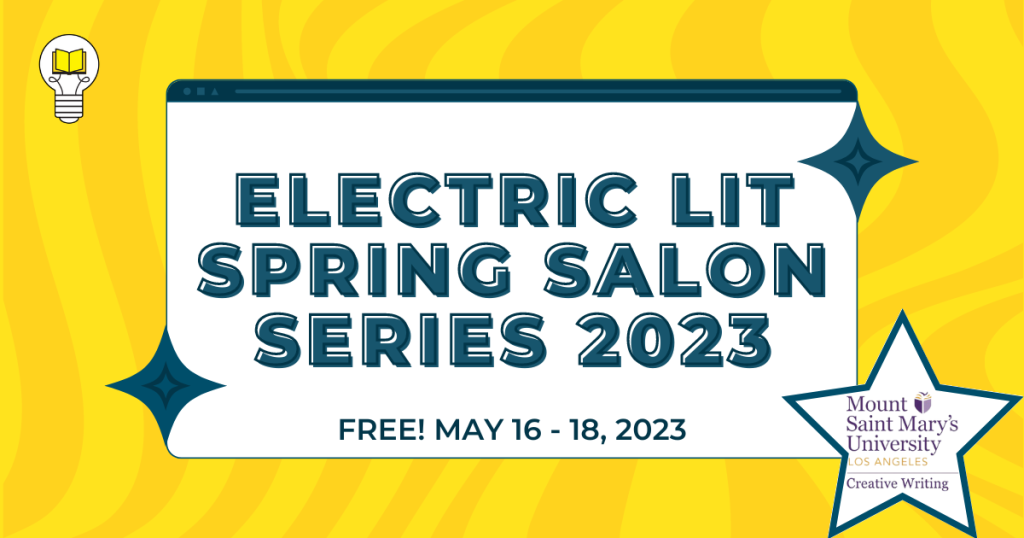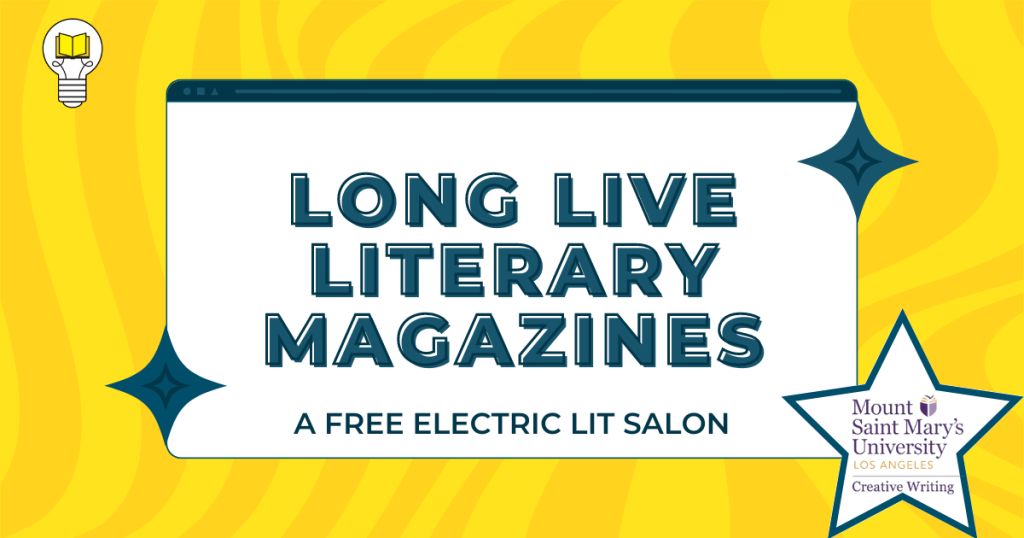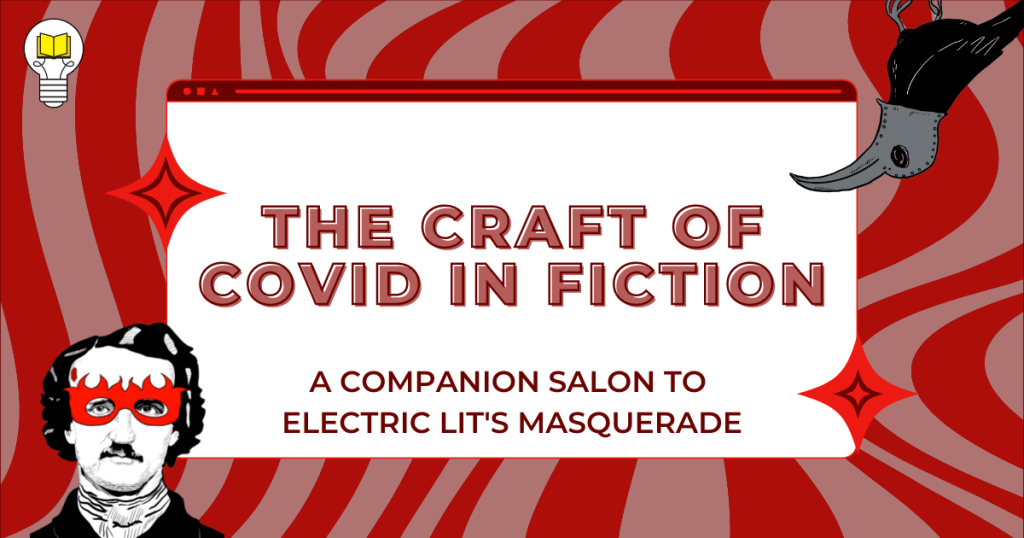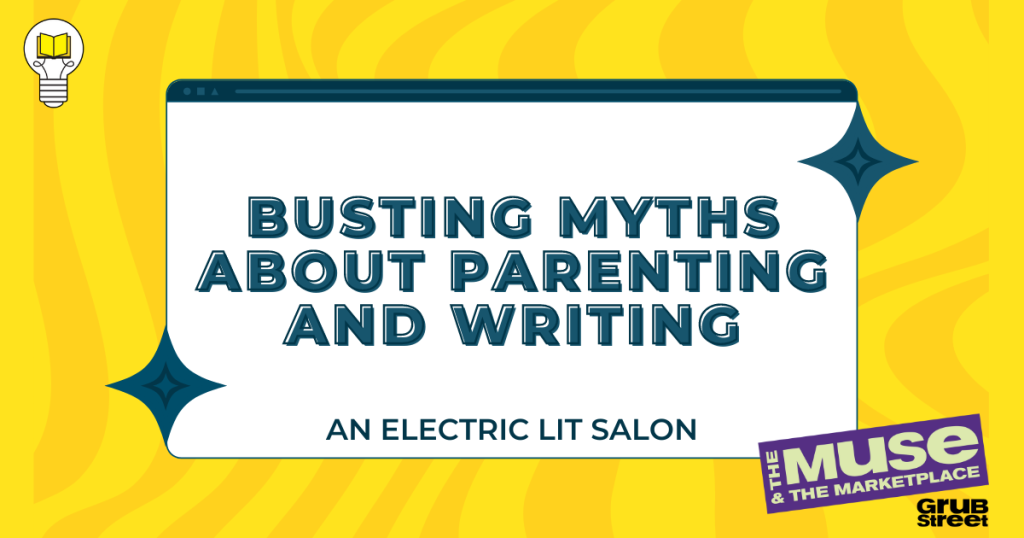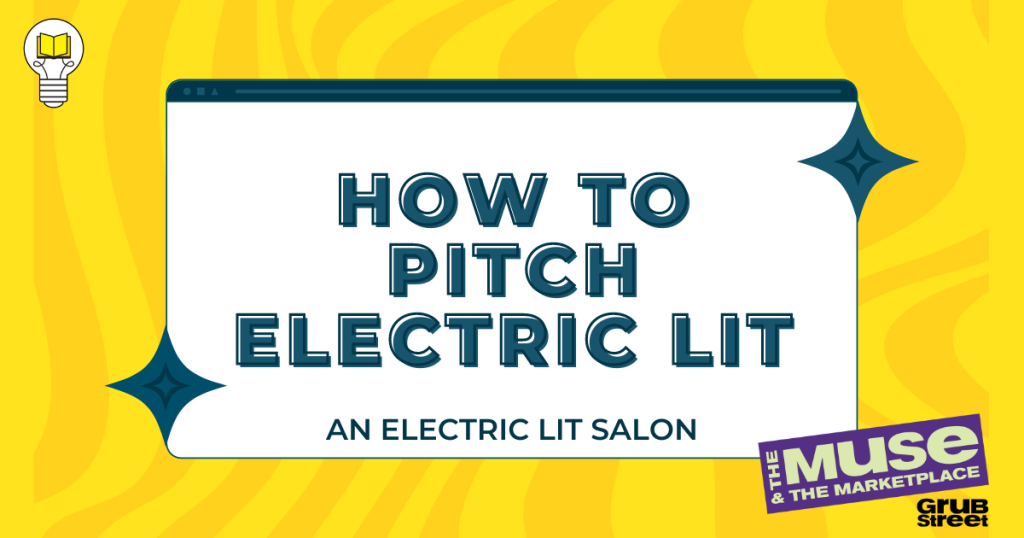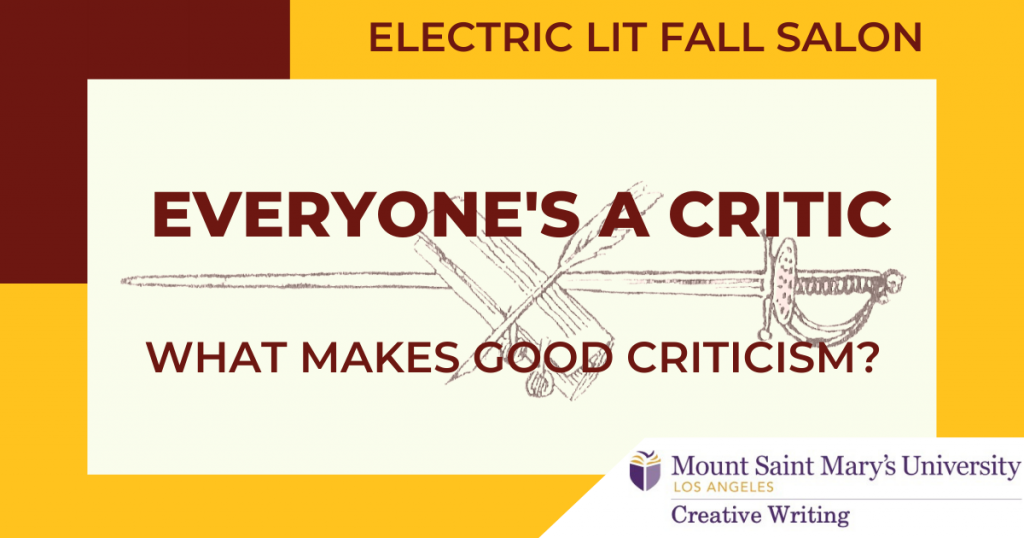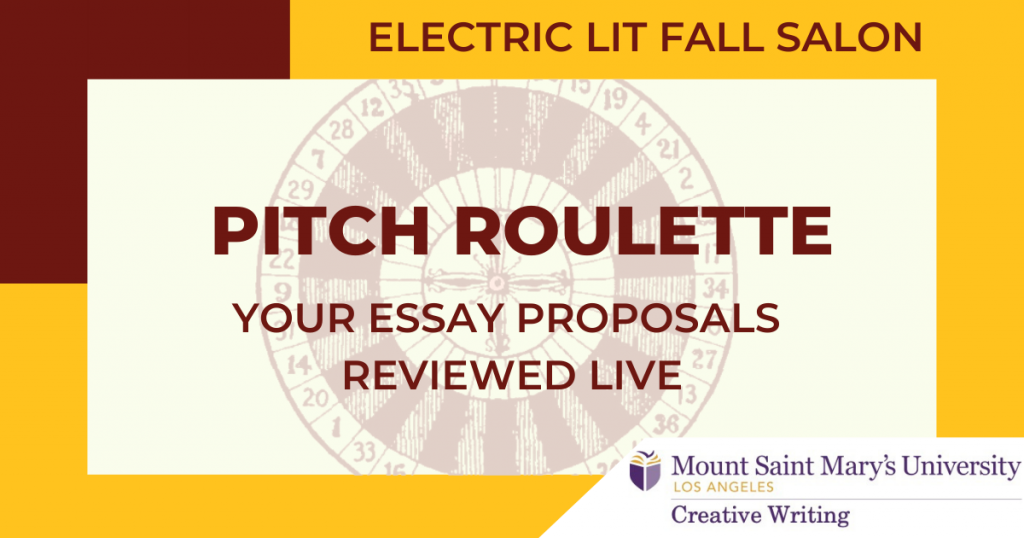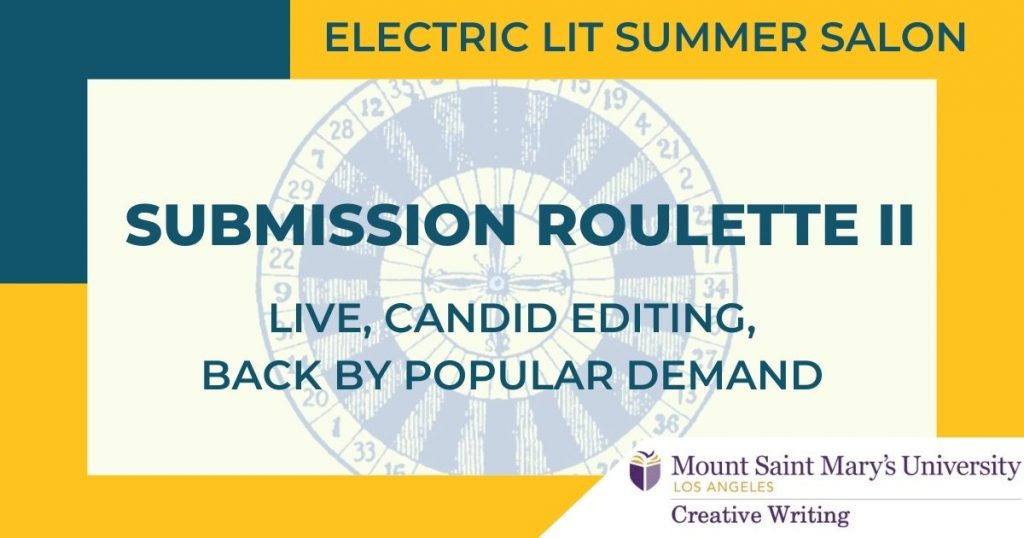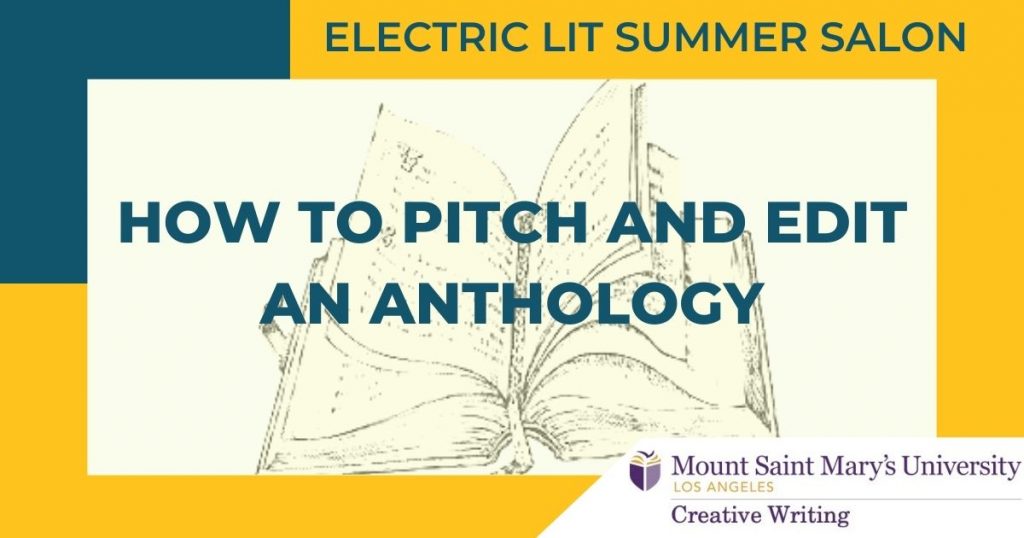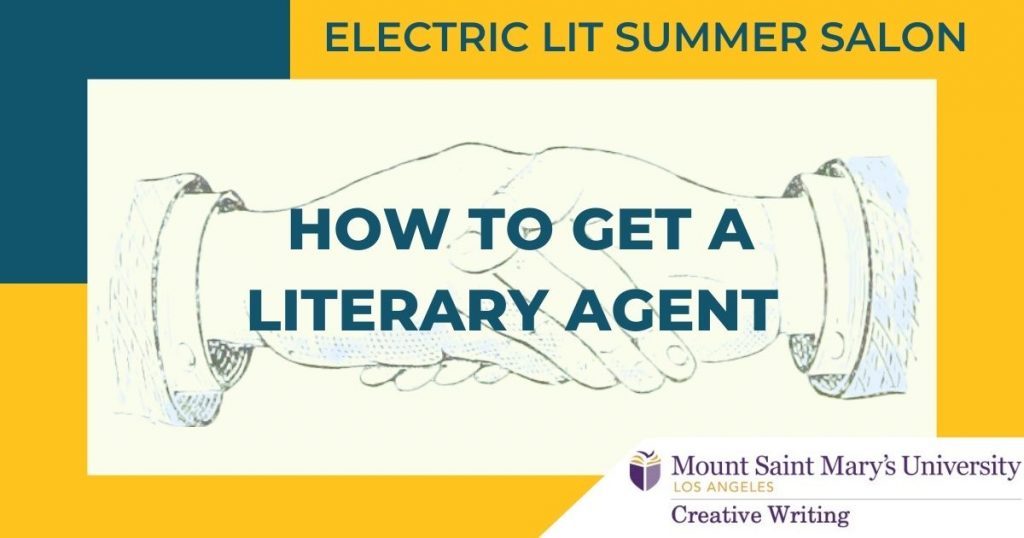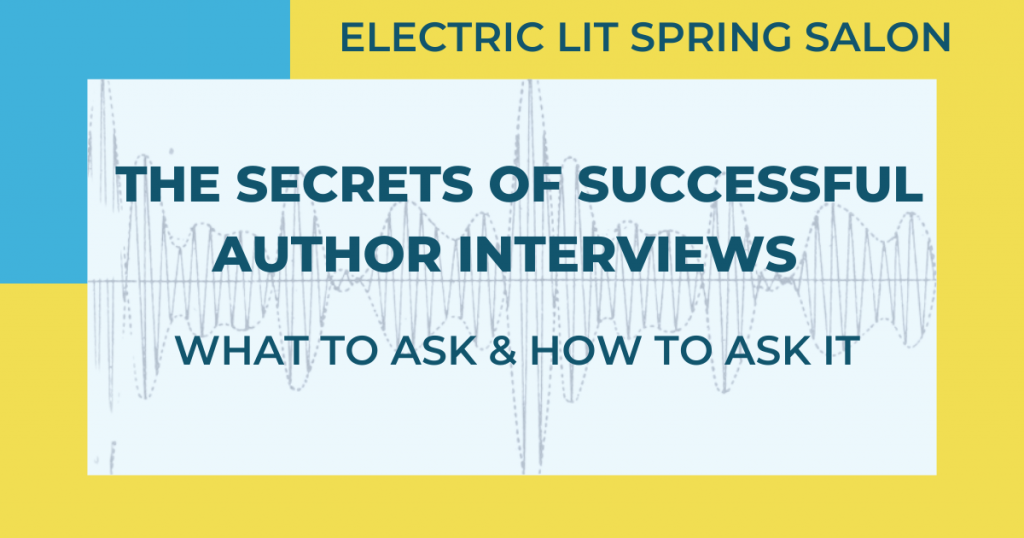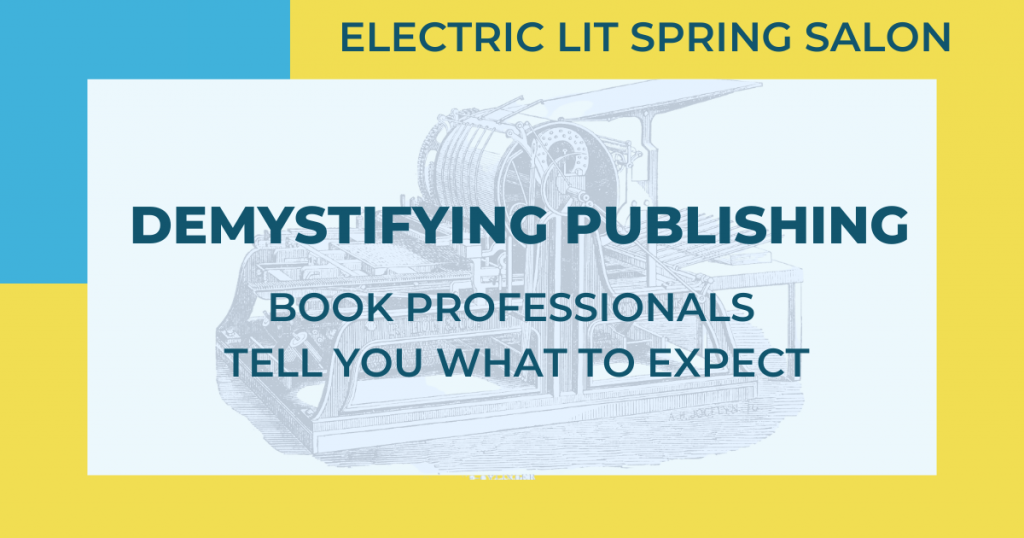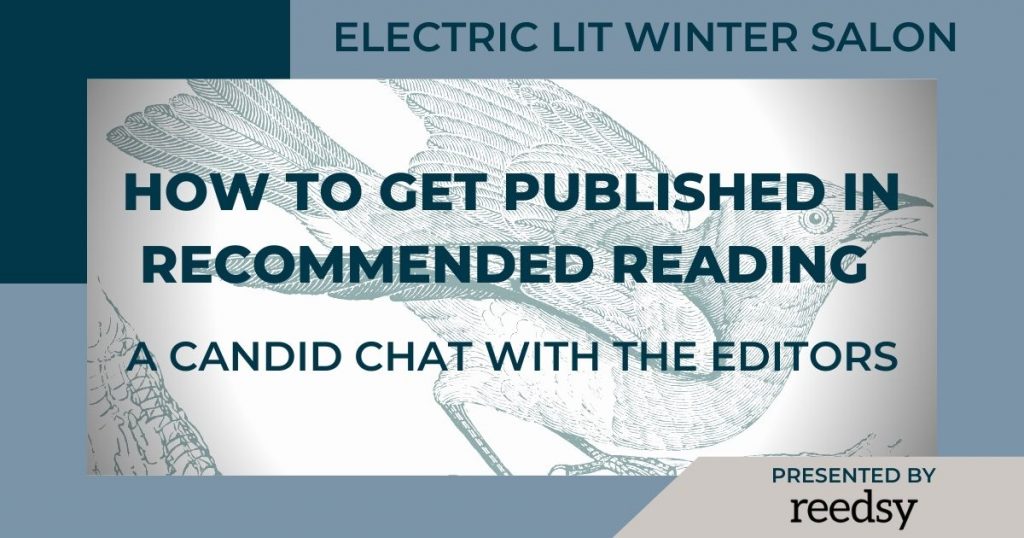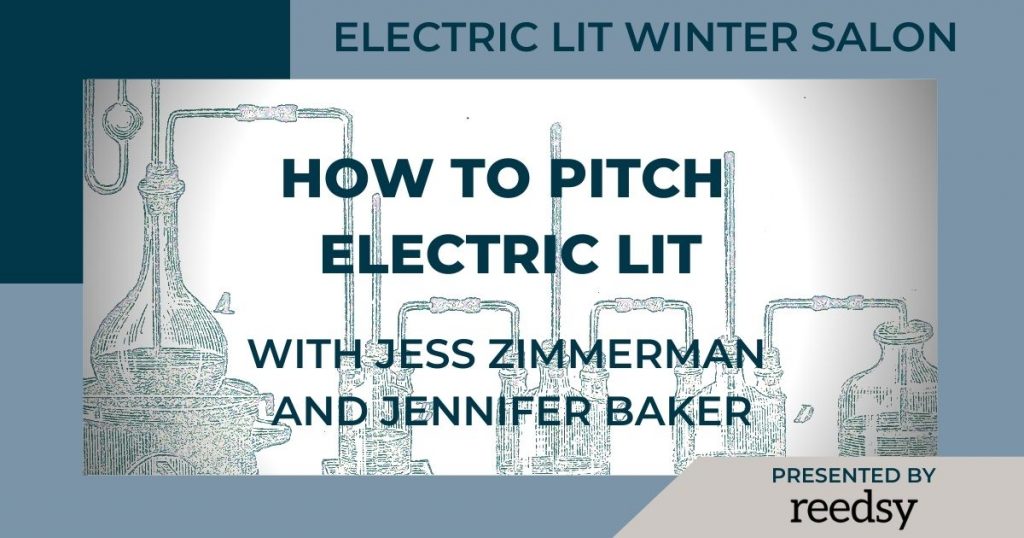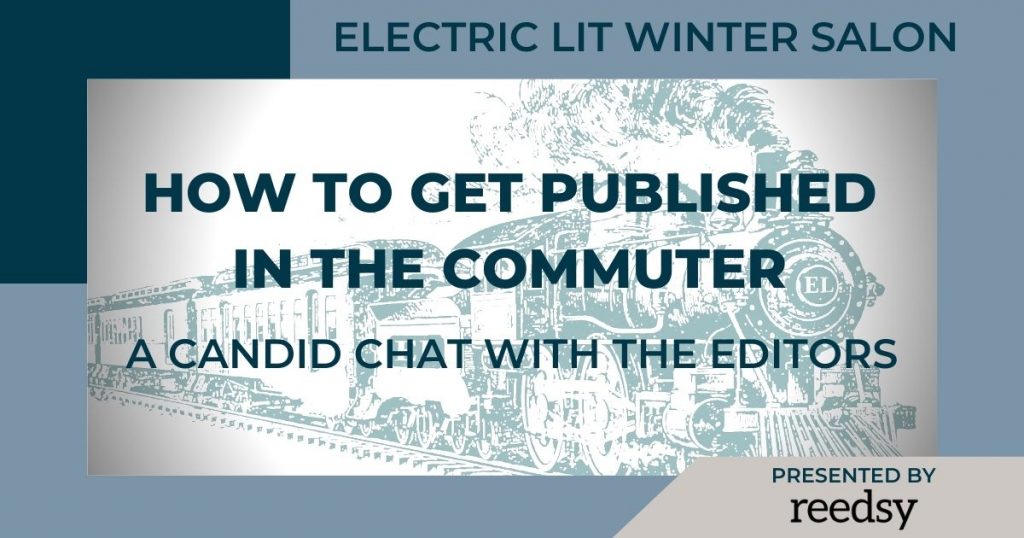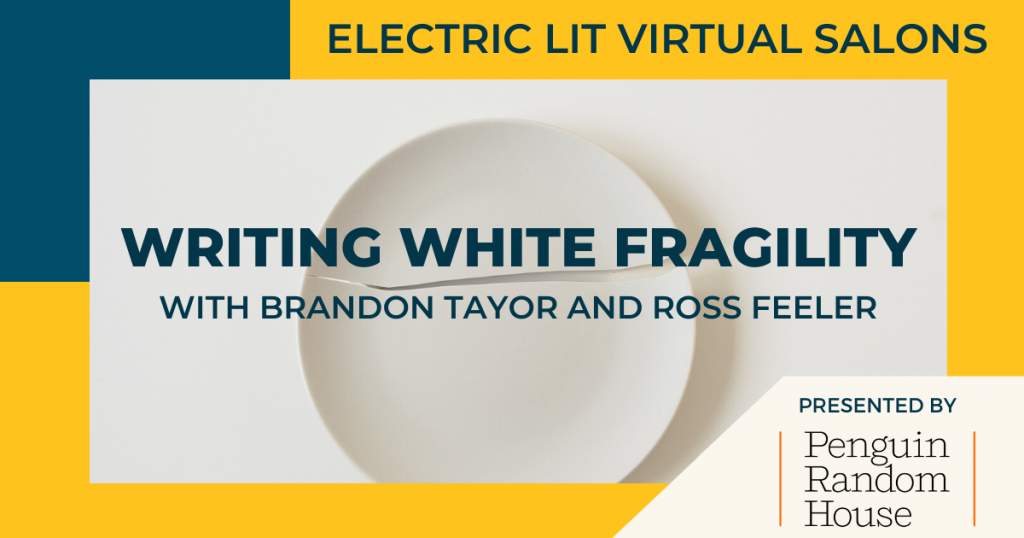Electric Literature’s 2023 Spring Salon Series is presented by Mount Saint Mary’s University and supported in part by the New York State Council on the Arts.

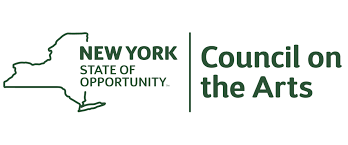
Electric Literature’s virtual salons demystify the craft of writing and look behind the curtain of the publishing process. All events in our Spring 2023 series are pay-what-you-want, and proceeds support Electric Literature’s mission to make literature more exciting, relevant, and inclusive.
Online registrations include unlimited replays that can be watched at anytime, for those who cannot attend the live broadcast. Below is a detailed list of our spring salons, which will be broadcast via Crowdcast.
Calling All Essayists: Announcing EL’s New Creative Nonfiction Program
Tuesday, May 16, 2023 at 3pm ET // Noon PT
Electric Lit has long been known as a publisher of essays that blend personal narrative with analysis and critique. Books, television, film—even music and visual art—often find themselves discussed in our digital pages. But in a creative climate rife with the closure of prominent literary magazines, Electric Literature wants to do more.
Essayists have been recently impacted by the shuttering of publishers like Catapult, Astra Magazine, Bookforum, and Bitch Magazine. Electric Literature wants to fill that void. This summer we will open submissions for general nonfiction. Though we will continue to publish work that engages with culture and media, EL will now be a home for the most urgent, honest, and artful nonfiction we can get our hands on.
Tune in to this free salon to hear EL’s essay editors, editor-in-chief Denne Michele Norris, associate editor Wynter Miller, and contributing editor Michelle Chikaonda in conversation to learn more about our new submission guidelines, and the kinds of essays that will take our breath away.
Literary Magazines Are Dead, Long Live Literary Magazines
Wednesday, May 17, 2023 at 5pm ET // 2pm PT
Book media loves to write a piece about a dead literary magazine. Living magazines, however, rarely attract the same prurient attention. Meanwhile, readers feel betrayed when beloved magazines with the same funding model (a single wealthy benefactor) continue to fail. But there are many literary magazines with alternative structures, young and old, online and in print, doing the work to stay alive in a culture that seems to like having them around, but celebrates them most fervently when they’re gone.
Electric Literature has assembled five independent magazines of significant literary influence that are forging their own paths. One Story is a 20-year-old print magazine with a devoted following that has never published the same writer twice. Taco Bell Quarterly was founded as a “reaction against everything” and is devoted to writing about Taco Bell. The Offing is volunteer run, and publishes work “that challenges, experiments, and provokes.” ZYZZYVA began in 1985 to reflect the cultural values that make San Francisco a cultural beacon, and offers themed, print issues on a wide range of topics. And for the last fourteen years, Electric Literature has been using our platform to launch new writers in a way that is exciting and inclusive.
Leadership from each of these publications will have a candid conversation about how they stay afloat, the role of literary magazines in the cultural landscape, and their predictions for the future. Moderated by Halimah Marcus, executive director of Electric Literature. Their discussion will be followed by an audience Q&A.
Horny Between the Covers: Women Writers on Lust
Thursday, May 18, 2023 at 5pm ET // 2pm PT
In a time when women’s bodily autonomy is under renewed legal attack, narratives about ungovernable female desire take on new urgency. As our laws regress, more and more contemporary fiction is pushing back against outdated beliefs regarding writing about sex, giving female horniness the central focus it deserves.
Our panelists Carmen Maria Machado (Her Body and Other Parties and In the Dream House), Rebecca Rukeyser (The Seaplane on Final Approach), and Lillian Fishman (Acts of Service) began this conversation during a packed panel at AWP, but found that there was still so much to say about bodies, lust, and publishing. Now Electric Literature is continuing the conversation for free, online. Whose desire gets to be depicted, and how are narratives about lust molded by society’s judgments? And how do authors navigate the vulnerable process of publishing explicit work? Moderated by Alyssa Songsiridej, author of Little Rabbit and managing editor at Electric Literature. Their discussion will be followed by an audience Q&A.
Past Salons (more details below):
- The Craft of Covid in Fiction
- Overcoming Rejection for Writers
- Busting Myths About Parenting and Writing
- How to Pitch Electric Lit: Updated
- Submission Roulette III
- Everyone’s a Critic
- Steel Yourself Before You Reveal Yourself
- Pitch Roulette
- Submission Roulette II
- How to Pitch and Edit an Anthology
- How to Get a Literary Agent
- The Secrets of Successful Author Interviews
- Demystifying Publishing
- Submission Roulette
- How to Get Published in Recommended Reading
- How to Pitch Electric Lit
- How to Get Published in The Commuter
- Writing White Fragility
- Swords Out: A Dungeons & Dragons Murder Mystery
- Magical Feminism
- Spot the Fake Memoir
The Craft of Covid in Fiction
Originally aired: October 6, 2022
Featuring: Rebecca Makkai, Jim Shepard, Weike Wang
The dynamic, unpredictable nature of the pandemic has forced novelists to become pundits, predicting what the world will look like when their novels are published. They also face unique craft challenges: how do masks affect dialogue, character descriptions, and scene? How do social distancing and quarantine warp relationship dynamics? Rebecca Makkai chose to move the events of I Have Some Questions for You to 2018, but still had to negotiate Covid protocol for courtroom scenes set in 2022. The protagonist of Weike Wang’s Joan Is Okay is an emergency room doctor in New York City; when Covid hit, Wang revised the novel to feature overwhelmed hospitals. A deadly flu ravages the globe in Phase Six by Jim Shepard, and the lessons of the Covid pandemic are in the distant past. These three novelists will discuss the drafting and revision process of their novels and explain how they tackled the ever-changing question of how Covid should factor into their work. Their discussion will be followed by a Q&A. Moderated by Halimah Marcus.
Overcoming Rejection for Writers
Originally Aired: April 4, 2022
Featuring Jami Attenberg, Deesha Philyaw, and Tommy Pico
Sponsored by GrubStreet’s Muse & the Marketplace conference
Whether you’re just starting out or a seasoned pro, all writers face rejection—but how we cope with that rejection plays a huge role in shaping our literary future. Rebounding can be tough, but rather than allowing rejection to stop us in our tracks, we can reframe it into a motivational and instructional tool. Some rejections actually make us stronger—as writers, editors, applicants, and people—while others just need to be ignored. Poet and TV writer Tommy Pico (JUNK, Reservation Dogs), memoirist Jami Attenberg (I Came All This Way to Meet You), and award-winning short story writer Deesha Philyaw (The Secret Lives of Church Ladies) will share stories from their own paths to publication, and talk about how they cope with hearing “no.” Moderated by Denne Michele Norris, editor-in-chief of Electric Literature. Their discussion will be followed by an audience Q&A.

Busting Myths About Parenting and Writing
Originally Aired: April 5, 2022
Featuring Claire Vaye Watkins, Kaitlyn Greenidge, and Matthew Salesses
Sponsored by GrubStreet’s Muse & the Marketplace conference
The idea that parenthood is a barrier to art creation is outdated, even dangerous—that we create in spite of having children rather than making complex work productively informed by parenthood in all its glory, sorrow, and ambivalence. The COVID-19 pandemic has brought parenting issues to the forefront of the national conversation, and the result has been that the discussions around parenthood specific to writing have evolved, too. Novelists Claire Vaye Watkins (I Love You But I’ve Chosen Darkness), Kaitlyn Greenidge (Libertie), and novelist and essayist Matthew Salesses (Craft in the Real World) will talk about the struggles, triumphs, stereotypes, and assumptions of writing as parents in the current literary and cultural moment. Moderated by Kelly Luce, author of Pull Me Under and the editor of The Commuter, Electric Literature’s weekly literary magazine for poetry, prose, and graphic narrative. Their discussion will be followed by an audience Q&A.

How to Pitch Electric Lit
Updated information with our new editors!
Originally Aired: April 6, 2022
Featuring Denne Michele Norris and Michelle Chikaonda
Sponsored by GrubStreet’s Muse & the Marketplace conference
Writing an essay, opinion piece, or feature doesn’t start with the first sentence. You have talent and a compelling idea, but how can you get an editor to pay attention? A pitch is the writer’s chance to package their work so that it catches an editor’s eye. In this conversation, Denne Michele Norris, Electric Literature editor-in-chief, and Michelle Chikaonda, contributing editor, will answer some key questions so you can take your essay from idea to successful pitch to published piece. We’ll discuss things like what makes a good pitch, common mistakes and misconceptions, and why Electric Lit even asks for pitches in the first place. This event is an update to our previous salon, “How to Pitch Electric Lit,” with our new editors. There will be a Q&A to follow.


Submission Roulette III
Drink (or hydrate!) whenever you spot a POV violation
Originally Aired: April 7, 2022
Featuring Halimah Marcus and Alyssa Songsiridej
Sponsored by GrubStreet’s Muse & the Marketplace conference
Tired of opaque form rejections that offer zero insights into why your submission “wasn’t a fit” or “doesn’t meet our publication’s needs”? Then join Submission Roulette III for, finally, some candid answers. Recommended Reading editors Halimah Marcus and Alyssa Songsiridej will review your anonymously submitted first pages, reading them for the first time live on screen, and share their immediate reactions as they go. What leads an editor to pass after just a few paragraphs, and what entices them to keep reading? And, since the chat has been so lively during past roulettes, we’ve added a fun new twist: we’ll all drink (or hydrate with a non-alcoholic beverage) every time we spot a POV violation.

Everyone’s a Critic
Originally aired: Thursday, October 7, 2021
Featuring A.O. Scott, Parul Sehgal, and Brandon Taylor
Whether it’s the role of take-downs, accusations of smarm, writers rebutting their reviews, or the daily Twitter discourse, the role of criticism in our culture is complex, ever-changing, and seemingly always up for debate. The tools of criticism are evolving, too. Goodreads, Substack, and social media remove critics from an ivory tower and allow anyone to assume the mantle. New Yorker staff writer and former New York Times book critic Parul Sehgal, New York Times film critic A.O. Scott, and novelist-cum-critic Brandon Taylor will discuss these topics as well as their own pursuits of critical honesty and excellence. Moderated by Halimah Marcus. Their discussion will be followed by an audience Q&A.

Steel Yourself Before You Reveal Yourself
Originally aired: Tuesday, October 12, 2021
Featuring Alexander Chee, Morgan Jerkins, Joe Osmundson
A good journalist reports the story, but never becomes the story. But as essayists and non-fiction writers, we’re not journalists. Sometimes our lives are, in fact, the story. What does it mean to write about ourselves and our lives, and then, to publish that writing? What does it mean when people read that writing, and discuss it—and us—publicly, as well as privately?
Alexander Chee (How To Write an Autobiographical Novel), Morgan Jerkins (This Will Be My Undoing), and Joseph Osmundson (Virology, forthcoming 2022) will discuss the choice to write about ourselves and dive into the public discourse as both writer and subject, and how to prepare for the unique scrutiny that comes with essay, memoir, and autobiographical writing. They will also offer tools to help writers determine how much of themselves to reveal in their writing in the first place. Moderated by Denne Michele Norris. Their conversation will be followed by an audience Q&A.
Pitch Roulette
Originally aired: Wednesday, October 13, 2021
Featuring Halimah Marcus and Denne Michele Norris
What goes through an editor’s mind when they read a pitch? What turns them off, and what grabs their interest? One of our most popular salons is back with a twist: Editor-in-Chief Denne Michele Norris and Executive Director Halimah Marcus will review your anonymous pitches, submitted just for this event. They will read each pitch for the first time live on screen, sharing their immediate reactions as they go. Your pitch may even be commissioned for Electric Lit!
Submission Roulette II
Originally aired: July 19, 2021
Featuring Halimah Marcus and Brandon Taylor
What goes through an editor’s mind when they read the first lines of your story? What can you do right away to hook them and keep them turning pages? Which tired moves make them groan and lose interest fast? One of our most exciting salon events is back by popular demand! Recommended Reading editors Halimah Marcus and Brandon Taylor return to edit your anonymous first pages, submitted just for this event. They will read each page for the first time live on screen, sharing their immediate reactions as they go. Here’s what previous attendees said about this event:
“Immediately planning to rewrite all my first pages.”
“Live impressions are true-to-life and that’s why this session has been so uniquely valuable.”
“10/10 would pay for more of these.”
“Just listening to the way they think has inspired me with like 5 revision ideas for a story I’m working on.”
How to Pitch and Edit an Anthology
Originally aired: July 20, 2021
Featuring:
- Sari Botton, editor of Goodbye To All That: Writers on Loving and Leaving New York (Seal Press, 2nd edition 2021)
- Jennifer Baker, editor of Everyday People: The Color of Life—A Short Story Anthology (Atria Books, 2018) and a senior editor at Amistad Books.
- Tajja Isen, co-editor of The World As We Knew It: Dispatches from a Changing Climate (Catapult 2022) and an editor of Catapult Magazine
- Moderated by Halimah Marcus, editor of Horse Girls: Recovering, Aspiring, and Devoted Riders Reclaim the Iconic Bond (Harper Perennial, August 2021) and executive director of Electric Literature
Have you ever dreamed of editing your own anthology? Even if you haven’t, should you? Join our panel of veteran anthology editors to learn how to develop an idea for an anthology, pitch it to publishers, solicit and edit work from writers, and pull together a finished book that unites a range of talented voices, all digging deep into a topic you are passionate about. We’ll also address how writers can get their work included in such anthologies. Whether you already have an idea for an anthology or you’re wondering if this publishing pathway might be right for you, bring your curiosity and your questions to this event. Audience Q&A to follow.
How to Get a Literary Agent
Originally aired: July 21, 2021
Sarah Bowlin, Aevitas Creative
Kirby Kim, Janklow and Nesbit
Renée Jarvis, Triangle House
Literary agents are the publishing professionals whose job is to be in an author’s corner, to champion their work and find it the best home and negotiate the strongest deals. So, how do you research hundreds of agents to find ones who would be the best fit for your creative visions? How do you query them to demonstrate that you are a perfect addition to their list? Once you’ve signed with an agent, what will your professional relationship look like? What are the reasons an author-agent relationship might end, and what should you do next? Join our panel of seasoned literary agents to learn about all about the process, from the early stages to the book deals and beyond, and bring all your questions to the Q&A. Moderated by Halimah Marcus.
The Secrets of Successful Author Interviews
Originally aired: March 11, 2021
Do you dream of having in-depth discussions with your favorite authors about their latest books? Join a panel of Electric Literature’s veteran interviewers—Tyrese Coleman, J.R. Ramakrishnan, and Arriel Vinson—to learn how the professionals do it. How do you pitch an interview to a publication and get the author to agree to talk to you? What are the secrets of crafting great interview questions—and how do you avoid the ones that thud? How do you get your conversation with the author to really flow—and if it does flow freely, is there any way to make transcribing less arduous? Our panel will dig into all of these questions and more. Moderated by Preety Sidhu. Q&A to follow.
Demystifying Publishing
Originally Aired: March 15, 2021
You know you want to publish a book—but you’re not sure how to take the first step, or even what the first step is. (“Write the manuscript,” obviously, right? Well, no, not always!) Agent DongWon Song (Howard Morhaim), nonfiction editor Rakia Clark (HMH), fiction editor Angeline Rodriguez (Orbit), and marketing director Meghan Deans (Ecco) open up the black box of publishing and walk you through the steps between “good idea” and “physical book you can sign.” Learn what to expect, what will be expected of you, what to watch out for, and how to prepare yourself to navigate the publishing world. Moderated by Jess Zimmerman. Q&A to follow.
Submission Roulette
Originally Aired: March 17, 2021
First impressions count—and they never count more than when you’re trying to impress an editor who has 1,500 submissions to read. Editors often say that they can tell within the first page whether a story will be worth accepting, so how do you make your first page really shine? Eavesdrop on our evaluation process—and vie to get your story noticed—with Recommended Reading editors Halimah Marcus and Brandon Taylor. They’ll be reading opening pages submitted just for the occasion, sharing their reactions and thought processes as they go. Submit your own first page anonymously to see if your story has what it takes to catch our editors’ eyes, or simply tune in to see how other writers fare.
How to Get Published in Recommended Reading
Originally Aired: December 11, 2020
About a third of the stories published in Recommended Reading are unsolicited submissions, which share space in the magazine with work by Pulitzer Prize and National Book Award winners. Unlike some legacy lit mags, we really are reading all the work you send in, and we really do publish it. So how can you make your stories stand out among the thousands of submissions we receive every year? Recommended Reading’s editorial team—Halimah Marcus, Brandon Taylor, Erin Bartnett, and Alyssa Songsiridej—pull back the curtain on their decision-making process and offer invaluable advice to short story writers. A must-watch for anyone who is planning to submit. Q&A to follow.
How to Pitch Electric Lit
Originally Aired: December 14, 2020
For freelancers, writing an essay, feature, or opinion piece doesn’t start when you type the first line. It starts with the pitch. Having a topic and a talent isn’t enough; you also have to be able to package your idea in a way that catches an editor’s eye. But how do you get started writing a pitch? How long is too long—and how short is too short? What does a good pitch look like—and a bad one? And why does Electric Lit ask people to write a pitch, anyway? Electric Literature editor-in-chief Jess Zimmerman and contributing editor Jennifer Baker fill you in on everything you need to know when proposing nonfiction work to Electric Lit and other publications.
How to Get Published in The Commuter
Originally Aired: December 16, 2020
Unlike most literary magazines, The Commuter chooses its weekly piece of poetry, flash, graphic, or experimental narrative almost exclusively from unsolicited submissions—9 out of 10 issues are drawn from the so-called “slush.” (We don’t think it’s slush!) Work published in The Commuter has been recognized by Best American Poetry and Comics, the Wigleaf Top 50, and Best Small Fictions. But we get thousands of submissions every year, and only publish 52 issues. So how can you help your work get recognized? Commuter editors Halimah Marcus, Kelly Luce, and Ed Skoog invite you behind the scenes for a frank editorial discussion that is a must-watch for anyone planning to submit. Q&A to follow.
Thank you to Reedsy, our presenting sponsor!

Writing White Fragility, an editorial discussion, presented by Penguin Random House
Originally Aired: October 20, 2020
Recommended Reading senior editor Brandon Taylor talks to Ross Feeler about “Parisian Honeymoon,” a story about a man who discovers that his new wife is a bigot. They will discuss their editing process, and how to write anti-racist stories with racist characters without being morally didactic.
This event is presented by Penguin Random House.
Swords Out: A Dungeons & Dragons Murder Mystery, presented by Substack
Originally Aired: October 22, 2020
Some of the funniest and most charismatic authors we know—John Darnielle, Leah Johnson, Daniel Lavery, Amber Sparks, and R. Eric Thomas—join Dungeon Master Matt Lubchansky for this classic tabletop role-playing game with a literary twist. The publisher of Lightning Bolt Literature has been murdered, and they’ll have to solve puzzles, fight monsters, and maybe even battle a god to get to the bottom of things. If you’ve never played D&D before, don’t worry—most of our players haven’t either.
This event is presented by Substack.
Magical Feminism, an editorial discussion
Originally Aired: October 26, 2020
Electric Literature executive director Halimah Marcus talks to Marie-Helene Bertino and Elissa Washuta about coping with trauma and subverting expectations at the intersection of magic and reality. They will discuss how magic works in practice and as a rhetorical device in fiction.
Spot the Fake Memoir, A Game of Two Truths and a Lie, presented by Sipsmith London
Originally Aired: October 28, 2020
Making stuff up is an important writerly skill, as long as you don’t present it as true. Five Electric Lit contributors and writing group pals Angela Chen, Lilly Dancyger, Deena ElGenaidi, Jeanna Kadlec, and Nina St. Pierre will try to pass autofiction off as memoir, in a literary twist on this time-honored get-to-know-you game. Hosted by Jess Zimmerman.
This event is presented by Sipsmith London.
Live Closed Captioning
Our virtual event platform, Crowdcast, is still working on providing built-in closed captioning. In the meantime, Google Chrome users can now use the new “Live Caption” feature. When enabled, Live Captions automatically appear in a small, moveable box at the bottom of your browser when you’re watching or listening to a piece of content where people are talking. Live Captions can be enabled in the latest version of Chrome by going to Settings, then the “Advanced” section, and then “Accessibility.”
All of our salons will also be uploaded to Youtube and made available through our store. Youtube now includes closed captioning. Simply hit the “CC” icon on the navigation bar on the bottom of your video player.




